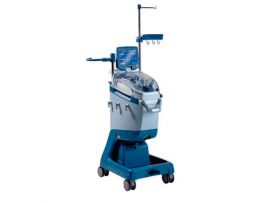Abstract To explore the challenges and describe the impact of the COVID-19 pandemic on intensive care nurses' experience in providing ECMO care in a high-volume Australian ICU ECMO centre that..
Read MoreAbstract Background Approximately 6000 intensive care units (ICUs) in the United States maintain extracorporeal membrane oxygenation (ECMO) programs.1 Patients who require ECMO are among the most critically ill in the ICU...
Read MoreAbstract Background Healthcare systems are operating under substantial pressures. Clinicians and managers are constantly having to make adaptations, which are typically improvised, highly variable and not coordinated across teams. This study..
Read MoreAbstract Bleeding following cardiac surgery is common and serious, yet a gap persists in understanding how experienced intensive care nurses identify and respond to such complications. Aim To describe the..
Read MoreIntroduction: Picture this: You're standing at the bedside of a critically ill patient in the ICU, their life hanging by a thread as cardiogenic shock takes hold. The monitors are..
Read MoreAbstract Purpose: Intensive care unit-acquired weakness (ICUAW) affects patient prognosis after cardiopulmonary bypass (CPB) surgery, but its risk factors remain unclear. We investigated these risk factors and developed a nomogram..
Read MoreAbstract Objective To determine the effect of intensive care unit (ICU) length of stay (LOS) on hospital mortality and non-home discharge for patients undergoing cardiac surgery over a 16-year period..
Read MoreAbstract Purpose To develop evidence-based clinical practice recommendations regarding transfusion practices and transfusion in bleeding critically ill adults. Methods A taskforce involving 15 international experts and 2 methodologists used the..
Read MoreAbstract Extra-corporeal membrane oxygenation (ECMO) is growing in adoption and popularity, as demonstrated by the international registry maintained by the Extracorporeal Life Support Organization (ELSO). While initially an adaptation of..
Read MoreAbstract Since the outbreak of the coronavirus disease 2019 (COVID-19) pandemic, more than 153 million cases have been confirmed, and more than 3.20 million individuals have died worldwide. The strategies..
Read MoreAbstract Acute respiratory distress syndrome (ARDS) after cardiac surgery is reported with a widely variable incidence (from 0.4%-8.1%). Cardiac surgery patients usually are affected by several comorbidities, and the development..
Read MoreAbstract Extracorporeal membrane oxygenation (ECMO) may be a life-saving procedure for patients with severe reversible pulmonary or cardiac failure or for patients in need for a bridge to transplantation. ECMO..
Read MoreSummary The COVID-19 pandemic strained health-care systems throughout the world. For some, available medical resources could not meet the increased demand and rationing was ultimately required. Hospitals and governments often..
Read MoreAbstract Background: Early warning systems that utilize dense physiologic data and machine learning may aid prediction of decompensation after congenital heart surgery (CHS). The Compensatory Reserve Index (CRI) analyzes changing..
Read MoreWelcome to the second collection of articles on the care of cardiac surgery patients in the intensive care unit. While the first installment covered the classic populations of cardiac..
Read MoreAbstract Background: The development of low cardiac output syndrome (LCOS) after cardiopulmonary bypass (CPB) occurs in up to 25% of neonates and is associated with increased morbidity. Invasive cardiac output..
Read MoreAbstract Objectives: The armamentarium of cardiac surgery continues to expand, and the cardiac intensivist must be familiar with a broad spectrum of procedures and their specific management concerns. In the..
Read MoreAbstract Objectives To describe the incidence and outcomes of radiologically confirmed acute CNS complications in extracorporeal membrane oxygenation patients at an Australian extracorporeal membrane oxygenation referral center and identify associated..
Read MoreAbstract Background Right ventricular (RV) dysfunction is a known risk factor for increased mortality in cardiac surgery. However, the association between RV performance and ICU morbidity is largely unknown. Methods..
Read MoreAbstract Objective Prolonged intensive care unit (ICU) stay prevents the use of ICU equipment by other patients and increases hospital cost. This retrospective study aimed to investigate the risk factors..
Read MoreThe use of veno-arterial extracorporeal membrane oxygenation (VA-ECMO) as a salvage therapy in cardiogenic shock is becoming of current practice. While VA-ECMO is potentially a life-saving technique, results are sometimes mitigated, emphasising the need for selecting..
Read More

















